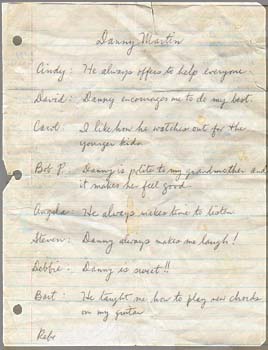Picking Up the Apples

The 4th Sunday in Ordinary Time
Today’s Readings: Jer 1: 4-5 and 17-19; Ps 71; 1 Cor 12: 31 – 13: 13; Lk 4: 21-30
A group of sales representatives from Milwaukee were in Chicago for the day to make an important business presentation. As it turned out, their meeting ran late, and the sales reps had to race to Union Station, tickets in hand, to catch their Amtrak train back to Milwaukee.
As the group raced through the main concourse, one guy accidentally knocked over a little table with a basket of apples on it. But the group kept hurrying along without so much as even looking back. With great sighs of relief, they quickly boarded the train.
All but one of them, that is.
One of the men paused, because he felt a twinge of conscience over what his associate had done. So he waved goodbye to his friends and went back into the terminal. He was glad he did. The ten-year-old boy with the apple stand was blind.
The salesman went around and gathered up the apples that had rolled all over the place. He noticed that several of them were bruised. He reached into his wallet and said to the boy, “Here, please take this ten dollars for the damage we did. I’m really sorry, and I hope we didn’t ruin your day.”
As the man started to walk away, the puzzled boy called after him, “Are you Jesus?”
The man stopped in his tracks… and he wondered.
How easy it is to ram your way through life, sometimes leaving damage and victims in your wake: people we may have snubbed or insulted, ignored or irritated. Maybe the exact wrong words might have slipped out of our mouth, and before you know it, it’s too late.
Don’t you just hate it when that happens? I sure do. I kick myself like Ralph Kramden for once again opening my BIG MOUTH.
The Lord has some words of encouragement for us today—for those of us who mess up, and for the ones who happen to get stepped on along the way.
First, for the ones who cause the trouble:
We hear that beautiful reading from the letter to the Corinthians that is a favorite at weddings: love is patient, love is kind, it is not jealous… But this is not a lesson only for brides and grooms or loving partners. It is aimed at all of us—the entire human race. The Lord is reminding us that the most important thing in the world is people. We are commanded to love them, and that means we have to treat them with kindness, respect, honesty and humility. Just exactly the way that Christ did.
In our little story about the blind boy and the apples, this child saw Jesus in the unexpected kind act of the businessman. “Are you Jesus?” he asked.
This is the standard we must strive for in our own dealings with people. If only we could pause for a split-second before we simply react to some situation! If only we could think: what is the patient, kind, loving thing to do?
Or at the very least, even if we make a mess of things, if we could only realize it right away and hurry back to try to make things right!
Just think how many messes you could have avoided-or at least minimized! It almost boggles the mind!
Now, for those who wind up as the victim:
Our first reading today gives us some words of wisdom from Jeremiah the prophet: Before I formed you in the womb, I knew you. This is also a message aimed at the entire human race. God, who knows and sees all things—past, present and future—has known us and loved us and given us a mission from all eternity. You might say that God has his loving and protective arms wrapped tightly around us as he propels us into the world.
Remember that, and listen again to what the Lord says about the people and hardships that want to drag us down, on purpose or by accident: Be not crushed on their account… for I am with you to deliver you.
We’ve all had the experience of having something rotten happen to us—and we can’t wait to turn to somebody close or important to us to tell them about it… not that they can necessarily make things better, but just because it makes us feel better to share our burden with someone we trust and someone who loves us.
But the truth be known, your very best confidant in the whole wide world is God! If only we would remember to go to him first and pour out our hearts and prayers to him! Who else promises what he promises us today? I am with you to deliver you. God’s devoted love and friendship can truly make any problem bearable and manageable.
I hope and pray that we all will take to heart Christ’s lesson today—a lesson that is simple but oh-so-very-important: to really learn to cherish one another and put each other first. Nothing in life matters more.
So always remember: take the time to go back and pick up the apples.


